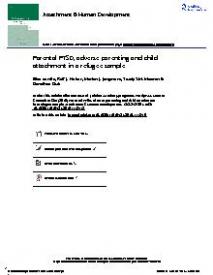Parental PTSD, adverse parenting and child attachment in a refugee sample.
In contrast with traumatic experiences, there is a dearth of studies on the link between trauma symptoms, disconnected (frightened, threatening and dissociative) parenting behavior, extremely insensitive parenting behavior and child attachment. This study extends previous work on the impact of posttraumatic stress disorder (PTSD) on families by studying the unique contribution of disconnected and extremely insensitive parenting behavior on child attachment in a highly traumatized sample of 68 asylum seekers and refugees and their children (18–42 months). The results show that parental symptoms of PTSD are directly related to children’s insecure attachment and disorganized attachment. The greatest proportion of the risk could be attributed to factors related to the dyad and not the family. A mediation effect of adverse parenting behavior was not confirmed. On the one hand the results indicate the need for an effective treatment of PTSD symptomatology while on the other hand the results indicate the need for clinical attention to insecure attachment relationships.
Geachte bezoeker,
De informatie die u nu opvraagt, kan door psychotraumanet niet aan u worden getoond. Dit kan verschillende redenen hebben,
waarvan (bescherming van het) auteursrecht de meeste voorkomende is. Wanneer het mogelijk is om u door te verwijzen naar de bron
van deze informatie, dan ziet u hier onder een link naar die plek.
Als er geen link staat, kunt u contact opnemen met de bibliotheek,
die u verder op weg kan helpen.
Met vriendelijke groet,
Het psychotraumanet-team.
Reference:
Elisa van Ee, Rolf J. Kleber, Marian J. Jongmans, Trudy T.M. Mooren, & Dorothee Out | 2016
In: Attachment & Human Development, ISSN 1461-6734 | 18 | 3 | 273-291
http://www.tandfonline.com/doi/abs/10.1080/14616734.2016.1148748
In: Attachment & Human Development, ISSN 1461-6734 | 18 | 3 | 273-291
http://www.tandfonline.com/doi/abs/10.1080/14616734.2016.1148748
Affiliation author(s):


